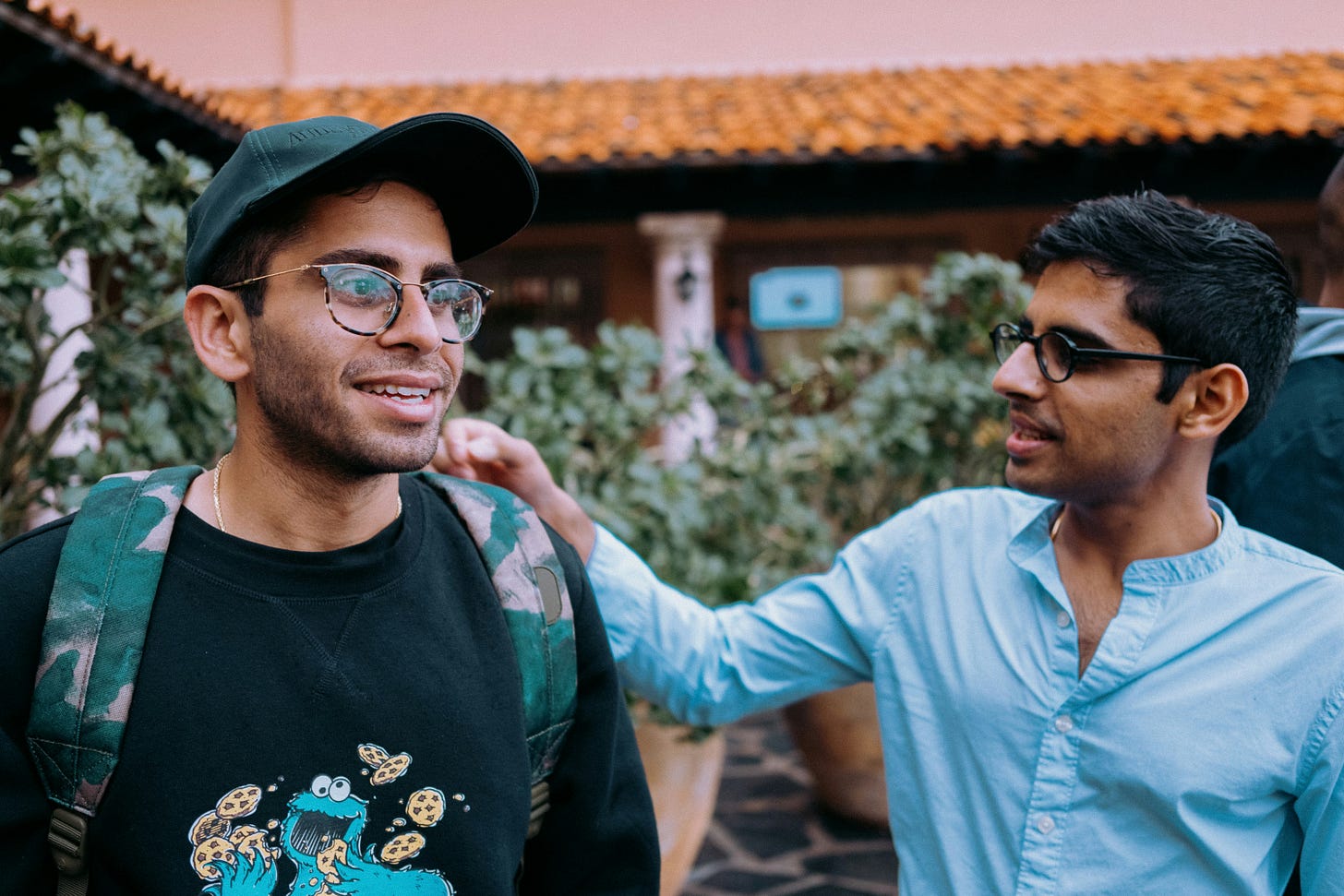This newsletter is a response to Diya Asha’s article, “The Price of Friendship With a ‘Good Man’” for Swaddle.
The article is the author’s reflection on a particular male friend in her life, an apparent “male feminist ally,” and his response to the nationwide protests against the rape and murder of a trainee doctor. The author concludes from her experience with this particular male friend, and indeed most of her male friends, that women have more to lose and little to gain from male friendship.
The article, I believe, accurately reflects the approach to male friendship among liberal, “enlightened” Indian women. It’s also somewhat concerning for several reasons: the author suggests no “way out” for men, making instead a harsh generalization that even the “good men” are as bad as the bad ones. She ends her article with the predictable statement that men must not “burden women” with the question of how they can be better friends and allies. (Who, I wonder, would be better suited to answering that question?) She also makes a half-hearted allusion to the need for a “brand-new, sparkling model of masculinity”—one she refuses to define or elaborate on. Because, you know, not our job to educate men, etc, etc.
Anyway, I thought I’d respond to this article. The main thing I want to say, of course, is that ‘good men’ exist.
My experience with good male friendship
I’ve written before about how my two-year dating fast led to me learning how to relate to men in a healthy, platonic way.
During that time I was able to cultivate valuable male friendships that I cherish to this day.
Here are some things that characterize my good male friendships:
Healthy boundaries
In her article for Swaddle, Diya writes:
When you’re a woman befriending a man, you become everything a male friend cannot be to that man. Mainstream media mirrors and concretises the reality in which men can only talk about their feelings with other men if there’s an epochal moment in their lives, not just a bad day at work. As a female friend to your guy friend, you are thus slotted into roles you never took on. You have to be a doll he can joke about women with, a makeshift therapist, and a walking encyclopaedia of feminism – expected to answer his every question with the ethnographic authority of lived experience. Since you're not offering sex in return for his friendship, you offer him something else: an alibi. Your sheer existence in his life guarantees him that he’s not like the other men. And when he does something wrong, others will cite you.
It’s kind of funny how polar opposite this description is to my own experience with male friendship.
For one, I have many male friends, and don’t serve as a “makeshift therapist” to any of them. It’s true that men are less emotionally responsive or “in touch” with their emotions than women are (one does not need a peer-reviewed study to know this is true, although there is no shortage of studies out there that prove this). So, men may naturally seek out emotional reassurance from women through vulnerable sharing.
The cool thing about friendship, though, is that women can always say “no”1. Both parties must have a say in setting the tone for the friendship. In my case, I’ve been able to set healthy boundaries with my male friends: they know that they cannot “dump” their emotions onto me (although when they do need a listening ear, they know they can talk to me). For my married male friends or those in committed relationships, we don’t spend too much one-on-one time together, and their more vulnerable sharing happens with their spouses or partners.
This, I think, is a sign of mature friendship. Have I had friendships with men that have been emotionally co-dependent? Sure. But I’ve been able to identify the adverse effect that dynamic has on me, and either removed myself from that friendship or worked to improve the dynamic.
I do think that in these conversations, especially when we’re talking about adult women, we mustn’t forget the agency that women have to improve their relationships.

Assuming they are good people unless proven otherwise
Following the recent rape case, there was a lot of chatter on social media about “educating the men in your life.” Some people even went so far as to suggest that women enroll the men in their lives for courses or classes where they might learn how to treat women with dignity and respect.
I’ll confess that the thought of sitting down with my good male friends and saying to them, “Did you know that rape is bad?” made me want to climb out of my skin. I can’t for the life of me fathom why we should treat the men in our lives like they have bad intentions. If we truly believe that they do, why are they in our lives? And if they do have bad intentions, would simply telling them to be different change them?
Rather, I believe that through mutual and respectful sharing of life experiences, men and women in platonic friendships can learn from each other how to be better friends and allies. I think of the time I opened up to a male friend in college about how I was groped at a college party. He was shocked that this happened not ten feet from where he must have stood at that party. It opened his eyes to the harassment women face daily, and he vowed to be more vigilant of his surroundings going forward.
When I think of our conversation, I recall that I did not place any of the blame on my friend. He was and still is a sweetheart, a true gentleman, and I know he would have spoken up and defended me in that moment had I gone to him. However, if I had framed my experience as proof that all men are violent perverts, he would have surely felt alienated and unfairly targeted.
Diya writes:
When protests erupted nationwide following the rape and murder of a trainee doctor, a friend shared a pointed dialogue from the film Newton: "You know what your problem is?" someone asks Newton, the titular protagonist, a righteous government clerk grappling with a flawed democracy. "My decency?" he asks. "No," comes the answer. "It’s your arrogance of not being a pervert. You want people to thank you for doing the bare minimum." […]
During the weeks of the protests, I mistakenly sent the Newton stills to [my male friend], having meant to send them to a female friend. My message read: "dude, i wish i could share this w all the men in our lives lmao." When I realised my mistake, I apologised and tried to change the subject, until he responded: "I thought you were taking a shot at me." After everything I’d been reading that day, I was angry at men, and he was no exception. I didn’t hold back: "hmm, i suppose if you felt called out, that’s worth self-evaluation."
She then records how her friend had a “hostile response” to her suggestion of self-evaluation.2 I can’t help but empathize with him. Perhaps his response was not ideal, but neither was hers. If she felt he was being a subpar feminist ally, was this the best way to bring it up? And if someone is truly ignorant of his actions, would suggesting “self-evaluation” but refusing to explain what exactly he has done wrong really help him to see his own mistakes?
Furthermore, the quote from Newton also rubs me the wrong way. I don’t think men expect to be congratulated for not being perverts. But is it so wrong to suggest that we be grateful for the good men in our lives? Isn’t gratitude, in general, a good thing to practice? I know that I’m grateful for the men in my life who have demonstrated healthy masculinity around me. I’m grateful that they look out for me, give me rides when I need one, make sure I get home safe, make sure I’m comfortable and taken care of in public settings, and speak up for me when I can’t speak up for myself. It’s not that I can’t or don’t do any of these things myself, but that when they demonstrate this healthy and uplifting brand of masculinity, I feel safe and loved. And it is a gift to feel that way! So what’s wrong with saying thank you?
A friendship built on mutual respect
Diya posits that men only view their female friends in a limited number of ways:
The crux of a male friend's self-proclaimed "goodness" is that it's conditional, dependent on women conforming to his limited worldview. The male friend is comfortable with his female friend as long as she remains within the neat boxes he has created for her – the "cool girl" who doesn't mind his possessiveness and lets him be, the "chill friend" who doesn't challenge his views but acts as a soundboard for his thoughts on feminism. The moment a woman steps outside these boundaries, she becomes a threat to the "good man". […]
A woman is either your sister, or like your sister, or she’s a girlfriend. There’s usually no in between. The only "in between," being a platonic friend to a man, comes with hidden costs.
To respond to this, let me tell you how some of my male friends view me.
J and I became friends in 2021 when we went on a cycling tour together. We bonded over our mutual love for theology, apologetics, and all things nerdy. A special memory I have with him is listening to an entire episode of Jordan Peterson’s podcast together while recovering from a particularly taxing hike at a backpacker’s lodge in Ladakh. J and I continue to have fun conversations about God, although he’s now in the seminary, so we talk less often. He sometimes gets to log into Instagram during his daily one-hour computer time, during which he’ll leave an encouraging comment on one of my new Instagram videos. He cheers me on in my online ministry and has been a source of encouragement, sound advice, and good laughs over the years.
D and I go way back, all the way to 2017. He was one of the first friends I made when I moved back to India. He’s been a constant friend over my various “phases”, showing up for chats over coffee, asking great questions, and taking an active interest in my life. I like to think I’m a similarly constant and encouraging presence to him. As we’ve grown up, we’ve had deep and honest conversations about old age and parents, grief, relationships, careers, and the future. He constantly encourages me to widen my horizons, which is something I’m ever grateful for. Also, he’s a riot to be around. Nobody makes dad jokes like D!

I don’t know about you, but these sound like solid friendships to me. Not once have I felt like I needed to tamp down my feminity, play off my emotions, or pretend to be someone I’m not in their presence. I do think that a couple of things help my male friends to be the good friends that they are: one, that they themselves have solid male friendships that they rightly prioritize over me, and two, that they love Jesus and so treat me with dignity and respect, as any God-fearing man would do.
Defining healthy masculinity

I want to end this newsletter by doing something Diya refused to do: articulating the ineffable qualities of good male-ness that women want to be surrounded with.
A good man sacrifices his wants for the needs of others. He is faithful to his daily duties, be it as a son, a husband, a brother, or a friend. He has his priorities in order. He is a man of action, especially when he perceives injustice in the world around him. He is open to feedback and direction. He is firm in his decision-making. He is gentle and encouraging. He seeks out community, investing in good friendships with other men first. He demonstrates self-control, especially over his physical and sexual appetites.3
You’ll notice that none of these qualities are exclusive to men, although a man exhibiting all of these traits would no doubt be a heck of a man. I’ll also add that, just like women, no man is perfect, and we can certainly extend compassion to our male friends who fall short in any of these ways.
Lastly, this is not an exhaustive list. What would you add?
Because we’re speaking about friendship, I’m assuming in all cases an equal power dynamic. Of course in cases of abusive or toxic friendships, women might not have complete freedom to say “no”, but I’m making the assumption in this newsletter that the friendship is neither toxic nor abusive.
I do not love it when authors share personal conversations almost verbatim in articles or essays. I don’t think it’s fair to portray someone in a negative light when they cannot defend themselves. Knowing nothing of the context or history of their friendship, we end up filling in the blanks with our own assumptions, and more often than not are simply spoon-fed the conclusion the author wants us to draw. However, since Diya has constructed her entire argument within the frame of this one friendship, I have no choice but to reproduce it here and respond to it.
I would be remiss not to mention this, but since Diya advocates the need for good role models of healthy masculinity, may I suggest an excellent example in Jesus Christ? Read here a remarkable breakdown of the healthy masculinity of Jesus Christ as detailed in the Gospel of Mark. You don’t have to be Christian to admire his exemplary character.




Thankyou for the mention Krys! glad to know Iv'e been one of the good men in your life. Keep writing!